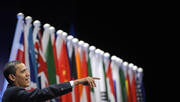 The G20 summit and its long build-up – Gordon’s world tour – clarified for me what has shifted in the geo-political landscape since the election of Obama. So dazzling is the President’s smile and so impressive his oratory that it is easy to lose sight of the content: or, more accurately, the form. But in London it became clear.
The G20 summit and its long build-up – Gordon’s world tour – clarified for me what has shifted in the geo-political landscape since the election of Obama. So dazzling is the President’s smile and so impressive his oratory that it is easy to lose sight of the content: or, more accurately, the form. But in London it became clear.
The age of Obama is shaping up to be an age of multi-lateralism for the sake of it: grand summits and gatherings at which statesmen draw up communiques and statements of intent as if that was what made a difference. In today’s Sunday Telegraph, I call the new elite the “neo-confs” – those who have an ideological commitment to conferences, meetings, talks, and talks about talks. As Fraser warned immediately, there is not a cent of new money among the $1.1 trillion unveiled by Gordon on Thursday. But, for the “neo-confs”, this is scarcely the point. The public bonhomie, the photo-calls, the red carpet: that is the substance. That is the point.
If the “neo-cons” had (in some cases), a simplistic faith in the capacity of military action to spread democracy, the “neo-confs” have a simplistic faith in the power of Jamie Oliver dinners, group hugs and goody bags. From London, the leaders of the West headed straight off to Strasbourg to resume the party, this time under the banner of Nato rather than the G20. They will all meet again soon, somewhere, and the mutual backslapping will doubtless continue. But it will continue without purpose. For the “neo-confs” really are standing athwart history: today’s electorates are less impressed than ever by such displays of elite power, less deferential and more “horizontally” connected to their peers than any previous generation, thanks to the web. What we saw in London last week was the end of something, not its dawn. The PM proved an adept party organiser and Barnum. But it will make not a jot of difference to his electoral fate, which was sealed long ago.






Comments